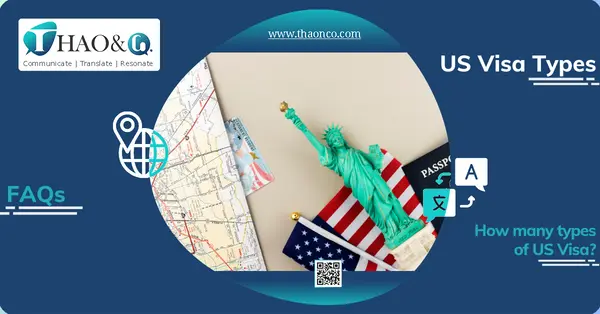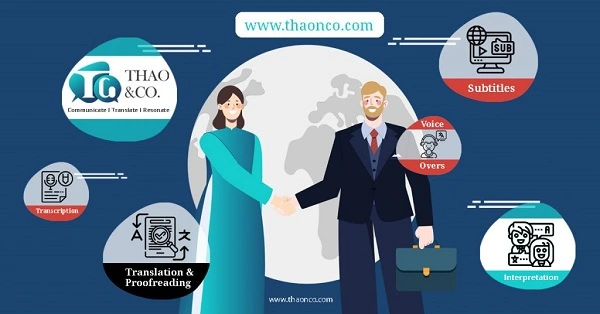The US visa is the ticket for travelers to set foot in this country for tourism, to visit family and friends, or to pursue education opportunities.
However, obtaining a US visa is no easy task due to the strict regulations in place. Hence, it is best to familiarize yourself with the various US visa types and to determine the most suitable option for your visit.
Don’t worry if you are new to this! Thao & Co. presents a comprehensive list of US visa types as well as the latest update on US visa requirements.
The US visa is an official stamp on your passport issued by a US embassy or consulate. It grants you permission to enter and stay in the US for the purpose stated on your visa stamp.
The US visas are divided into 2 main categories: Immigrant and nonimmigrant visas.
The US immigrant visa is classified into 3 main groups: family-sponsored, employer-sponsored, and other immigrant visas. Some of the most commonly known types of US immigrant visas are:
According to the US government’s official website, there are over 30 types of US nonimmigrant visas categorized based on the purpose of travel. Among those, the most popular types of visa are:

The US offers a variety of nonimmigrant visas designated for specific purposes of travel, such as tourism, education, business, visiting family, or other special purposes. Here is an overview of some common categories:
B1 visa: Issued to individuals entering the US for business-related activities, such as meetings or negotiations
B2 visa: Issued to individuals entering the US for tourism, visiting family, or medical treatment. The combined B-1/B-2 visa allows for both business and tourism purposes.
F1 visa: Issued to full-time students enrolled in universities, colleges, or other academic institutions in the US
F2 visa: Issued to the spouse or children of F1 visa holders
M1 visa: Issued to students enrolled in vocational or other recognized nonacademic institutions in the US
M2 visa: Issued to the spouse or children of M1 visa holders
J1 visa: Issued to individuals approved to participate in exchange visitor programs in the US, including students, Ph.D. candidates, and experts
J2 visa: Issued to the spouse or children of J1 visa holders
H-1B visa: For applicants working in a specialty occupation with at least a bachelor’s degree, or equivalent experience in the specialty occupation
H-2A visa: For applicants performing temporary or seasonal agricultural work
H-2B visa: For applicants performing temporary or seasonal non-agricultural work
H-3 visa: For applicants receiving training in any field other than graduate medical or academic training
L visa: For applicants working in a managerial or executive capacity; or applicants working in a position requiring specialized knowledge in a branch, parent company, affiliate, or subsidiary of their current employer in the US
O visa: For applicants with extraordinary abilities or achievements in the field of science, art, education, business, or athletics
P-1 visa: For applicants who are recognized athletes or members of an entertainment/sports group
E-1 visa: Issued to eligible nationals of countries with which the US maintains treaties of commerce and navigation
R-1 visa: For persons who want to enter the US to work temporarily in religious capacities
C visa: For individuals transiting through the United States en route to another country
I visa: For representatives of the foreign media, including members of the press, radio, film, and print industries
D visa: For crewmembers of commercial sea vessels or international airlines in the US
Each visa category has its own eligibility criteria and document requirements. Hence, applicants need to correctly identify the purpose of their trip in order to apply for a suitable visa type.
The immigrant visa allows its holder to live and work in the US permanently. Here are the main categories of US immigrant visas:
IR1/CR1 visa: For foreign spouses of US citizens
IR2/CR2 visa: For unmarried children under 21 years of age of US citizens
IR-3/IR-4 visa: For adoptive children of US citizens (adopted in another country or to be adopted in the US)
R-5 visa: For parents of US citizens (The sponsor must be at least 21 years old)
K-1 visa: For fiancé(e)s of US citizens to get married in the US
K-3 visa: For spouses of US citizens awaiting immigration application processing
F1 visa: For unmarried children of US citizens and their minor children
F2A visa: For spouses and children (unmarried and under 21 years of age) of lawful permanent residents in the US
F2B visa: For unmarried children (21 years of age and older) of lawful permanent residents in the US
F3 visa: For married children of US citizens
F4 visa: For siblings of US citizens, their spouses, and children (The sponsor must be at least 21 years old.)
EB-1 visa: For priority workers (experts with extraordinary abilities, outstanding professors or researchers, executives, and managers)
EB-2 visa: For workers holding an advanced degree or having exceptional abilities in the fields of science, art, or business
EB-3 visa: For skilled workers, professionals, or other workers
EB-4 visa: For special immigrants, including religious workers, employees of international organizations, and other special cases
EB-5 visa: For investors who make the necessary investment in a commercial enterprise in the US (1 million USD or 500,000 USD within a targeted employment area) and create 10 permanent full-time jobs for qualified US workers
Like nonimmigrant visas, the eligibility and procedures for immigrant visas vary depending on each visa category. Applicant needs to stay updated on the latest information to select a suitable visa type and prepare all the required documents.
Check out some frequently asked questions about the US visa:

As the US visa process is quite selective, this visa is considered one of the most powerful visas in the world.
Depending on your nationality and the regulations of your destination country, if you have a valid US visa, you might be granted visa-free entry to certain countries.
Here are some examples:
US visa holders may also be granted visa-free entry to the Caribbean Islands, South American countries, the Cayman Islands, the US Virgin Islands, and the British Virgin Islands.
The US is currently the country with the largest number of visa types categorized based on the purpose of travel. The approval rate for US visas depends on several factors, such as your visiting purpose and the nature of your application.
Here are the visa categories that typically have a higher approval rate:
US visa application services offer numerous benefits, but it is worth considering the pros and cons before entrusting them with your documents. If you want to skip researching the process, then visa application services may be the right choice for you.
With knowledge and experience in handling visa applications, these services can streamline the process and save you a lot of time and effort. In addition, they can also help you strengthen your application to increase your chance of getting approved.
However, it is important to engage a reputable agency with a transparent workflow to avoid complications and hidden fees beyond initial agreements.
In this age of information and technology, it is not difficult to find information on US visa types and guides on how to apply for a US visa. Applying for a visa independently might be a good option if you want to have complete control over your application and save money.
When applying for a US visa, non-English documents need to be translated and certified before submitting to the authorities. It is an important step to complete your application and make a good impression on visa officers.

If you are looking for visa translation services, look no further than Thao & Co.! We specialize in providing high-quality translations for visa applications.
Our experts are not only proficient in language and translation but also have experience in handling US visa documents. With their expertise, we ensure your application meets the requirements of the US consulate, thus maximizing your chance of success.
By choosing Thao & Co.’s certified translation services, you can enjoy numerous benefits:
Applying for a US visa can be stressful. That’s why Thao & Co. is here to help you take the first step to your American dream. Leave your information on our Get a Quote page to receive a free consultation and secure your peace of mind.